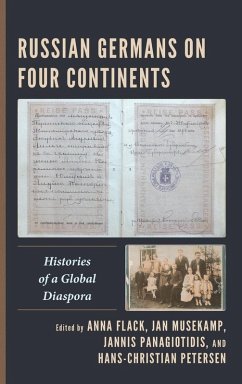Russian Germans on Four Continents
Histories of a Global Diaspora
Herausgeber: Flack, Anna; Panagiotidis, Jannis; Musekamp, Jan
Russian Germans on Four Continents
Histories of a Global Diaspora
Herausgeber: Flack, Anna; Panagiotidis, Jannis; Musekamp, Jan
- Gebundenes Buch
- Merkliste
- Auf die Merkliste
- Bewerten Bewerten
- Teilen
- Produkt teilen
- Produkterinnerung
- Produkterinnerung
The history of Russian Germans (Russlanddeutsche) is one of intensive mobility across space and time. In this volume, authors from the fields of history, sociology, cultural studies, and sociolinguistics analyze key issues of the history and present of this globally connected diaspora group from an interdisciplinary angle.
Andere Kunden interessierten sich auch für
![The Germans of the Soviet Union The Germans of the Soviet Union]() Irina MukhinaThe Germans of the Soviet Union49,99 €
Irina MukhinaThe Germans of the Soviet Union49,99 €![The Intimacies of Four Continents The Intimacies of Four Continents]() Lisa LoweThe Intimacies of Four Continents35,99 €
Lisa LoweThe Intimacies of Four Continents35,99 €![The Redbreast The Redbreast]() Jo NesboThe Redbreast10,99 €
Jo NesboThe Redbreast10,99 €![The Redbreast The Redbreast]() Jo NesboThe Redbreast18,99 €
Jo NesboThe Redbreast18,99 €![Racism Racism]() George M. FredricksonRacism23,99 €
George M. FredricksonRacism23,99 €![Germans in Flanders 1915: Images of War Series Germans in Flanders 1915: Images of War Series]() David BiltonGermans in Flanders 1915: Images of War Series18,99 €
David BiltonGermans in Flanders 1915: Images of War Series18,99 €![Romania and the Quest for European Identity Romania and the Quest for European Identity]() Cristian CercelRomania and the Quest for European Identity37,99 €
Cristian CercelRomania and the Quest for European Identity37,99 €-
-
-
The history of Russian Germans (Russlanddeutsche) is one of intensive mobility across space and time. In this volume, authors from the fields of history, sociology, cultural studies, and sociolinguistics analyze key issues of the history and present of this globally connected diaspora group from an interdisciplinary angle.
Hinweis: Dieser Artikel kann nur an eine deutsche Lieferadresse ausgeliefert werden.
Hinweis: Dieser Artikel kann nur an eine deutsche Lieferadresse ausgeliefert werden.
Produktdetails
- Produktdetails
- Verlag: Lexington Books
- Seitenzahl: 338
- Erscheinungstermin: 11. Dezember 2023
- Englisch
- Abmessung: 235mm x 157mm x 23mm
- Gewicht: 630g
- ISBN-13: 9781666911718
- ISBN-10: 1666911712
- Artikelnr.: 68887629
- Herstellerkennzeichnung
- Books on Demand GmbH
- In de Tarpen 42
- 22848 Norderstedt
- info@bod.de
- 040 53433511
- Verlag: Lexington Books
- Seitenzahl: 338
- Erscheinungstermin: 11. Dezember 2023
- Englisch
- Abmessung: 235mm x 157mm x 23mm
- Gewicht: 630g
- ISBN-13: 9781666911718
- ISBN-10: 1666911712
- Artikelnr.: 68887629
- Herstellerkennzeichnung
- Books on Demand GmbH
- In de Tarpen 42
- 22848 Norderstedt
- info@bod.de
- 040 53433511
Edited by Anna Flack; Jan Musekamp; Jannis Panagiotidis and Hans-Christian Petersen - Contributions by James Casteel; Alicia Cipria; Anna Flack; Tetiana Havlin; Concha Maria Höfler; Matthias Kaltenbrunner; Anna Kozlova; Lucas Löff Machado; Jan Musekamp; J
Acknowledgments
Introduction: Russian Germans on Four Continents, Anna Flack, Jan Musekamp,
Jannis Panagiotidis, and Hans-Christian Petersen
Chapter 1: Russian German History as Global History: Beyond Ethnonational
Frames, James Casteel
Part I: Regimes of Migration and Belonging
Chapter 2: Navigating Global Color Lines: Volhynia's German Speakers on the
Move, Jan Musekamp
Chapter 3: 'Canada Needs Us': An Analysis of Transnational Russian-German
Migration through the Manitoba Provincial Nominee Program, Anna Kozlova
Chapter 4: How Germany Determines what "Being German" Means in the
Post-Soviet Space, Concha Maria Höfler
Part II: Networks
Chapter 5: Transatlantic Diaspora Activism and Völkisch Heritage: Karl
Stumpp and the Russian Germans, Hans-Christian Petersen
Chapter 6: The Transnational Exchange of Ideas: The Russian-German
Dissident Emigration Movement's Impact on Soviet Domestic and Foreign
Policy (1972-1987), Eric J. Schmaltz
Chapter 7: Entrepreneurial Networks of Russian-Speaking Germans across the
Eurasian Space: From a Family Store to a Transnational Supermarket Chain,
Tetiana Havlin
Part III: War and Violence
Chapter 8: The Deportation of Russian Germans to Kazakhstan in 1941 and
their Subsequent Fate, J. Otto Pohl
Chapter 9: Pacifists and Nazi Sympathizers? Narrating the Canadian
Mennonite World War II Experience in the Local Cultures Project, Matthias
Kaltenbrunner
Part IV: Language
Chapter 10: Volga Germans in Entre Ríos, Argentina: Global Changes,
Language Maintenance and Shift, Alicia Cipria
Chapter 11: "I don't know where this comes from that they call us Russian
Germans":
The Role of Linguistic, Ethnic, and Confessional Labels in the Former
Colônia Guarany (Brazil), Lucas Löff-Machado
About the Contributors
Introduction: Russian Germans on Four Continents, Anna Flack, Jan Musekamp,
Jannis Panagiotidis, and Hans-Christian Petersen
Chapter 1: Russian German History as Global History: Beyond Ethnonational
Frames, James Casteel
Part I: Regimes of Migration and Belonging
Chapter 2: Navigating Global Color Lines: Volhynia's German Speakers on the
Move, Jan Musekamp
Chapter 3: 'Canada Needs Us': An Analysis of Transnational Russian-German
Migration through the Manitoba Provincial Nominee Program, Anna Kozlova
Chapter 4: How Germany Determines what "Being German" Means in the
Post-Soviet Space, Concha Maria Höfler
Part II: Networks
Chapter 5: Transatlantic Diaspora Activism and Völkisch Heritage: Karl
Stumpp and the Russian Germans, Hans-Christian Petersen
Chapter 6: The Transnational Exchange of Ideas: The Russian-German
Dissident Emigration Movement's Impact on Soviet Domestic and Foreign
Policy (1972-1987), Eric J. Schmaltz
Chapter 7: Entrepreneurial Networks of Russian-Speaking Germans across the
Eurasian Space: From a Family Store to a Transnational Supermarket Chain,
Tetiana Havlin
Part III: War and Violence
Chapter 8: The Deportation of Russian Germans to Kazakhstan in 1941 and
their Subsequent Fate, J. Otto Pohl
Chapter 9: Pacifists and Nazi Sympathizers? Narrating the Canadian
Mennonite World War II Experience in the Local Cultures Project, Matthias
Kaltenbrunner
Part IV: Language
Chapter 10: Volga Germans in Entre Ríos, Argentina: Global Changes,
Language Maintenance and Shift, Alicia Cipria
Chapter 11: "I don't know where this comes from that they call us Russian
Germans":
The Role of Linguistic, Ethnic, and Confessional Labels in the Former
Colônia Guarany (Brazil), Lucas Löff-Machado
About the Contributors
Acknowledgments
Introduction: Russian Germans on Four Continents, Anna Flack, Jan Musekamp,
Jannis Panagiotidis, and Hans-Christian Petersen
Chapter 1: Russian German History as Global History: Beyond Ethnonational
Frames, James Casteel
Part I: Regimes of Migration and Belonging
Chapter 2: Navigating Global Color Lines: Volhynia's German Speakers on the
Move, Jan Musekamp
Chapter 3: 'Canada Needs Us': An Analysis of Transnational Russian-German
Migration through the Manitoba Provincial Nominee Program, Anna Kozlova
Chapter 4: How Germany Determines what "Being German" Means in the
Post-Soviet Space, Concha Maria Höfler
Part II: Networks
Chapter 5: Transatlantic Diaspora Activism and Völkisch Heritage: Karl
Stumpp and the Russian Germans, Hans-Christian Petersen
Chapter 6: The Transnational Exchange of Ideas: The Russian-German
Dissident Emigration Movement's Impact on Soviet Domestic and Foreign
Policy (1972-1987), Eric J. Schmaltz
Chapter 7: Entrepreneurial Networks of Russian-Speaking Germans across the
Eurasian Space: From a Family Store to a Transnational Supermarket Chain,
Tetiana Havlin
Part III: War and Violence
Chapter 8: The Deportation of Russian Germans to Kazakhstan in 1941 and
their Subsequent Fate, J. Otto Pohl
Chapter 9: Pacifists and Nazi Sympathizers? Narrating the Canadian
Mennonite World War II Experience in the Local Cultures Project, Matthias
Kaltenbrunner
Part IV: Language
Chapter 10: Volga Germans in Entre Ríos, Argentina: Global Changes,
Language Maintenance and Shift, Alicia Cipria
Chapter 11: "I don't know where this comes from that they call us Russian
Germans":
The Role of Linguistic, Ethnic, and Confessional Labels in the Former
Colônia Guarany (Brazil), Lucas Löff-Machado
About the Contributors
Introduction: Russian Germans on Four Continents, Anna Flack, Jan Musekamp,
Jannis Panagiotidis, and Hans-Christian Petersen
Chapter 1: Russian German History as Global History: Beyond Ethnonational
Frames, James Casteel
Part I: Regimes of Migration and Belonging
Chapter 2: Navigating Global Color Lines: Volhynia's German Speakers on the
Move, Jan Musekamp
Chapter 3: 'Canada Needs Us': An Analysis of Transnational Russian-German
Migration through the Manitoba Provincial Nominee Program, Anna Kozlova
Chapter 4: How Germany Determines what "Being German" Means in the
Post-Soviet Space, Concha Maria Höfler
Part II: Networks
Chapter 5: Transatlantic Diaspora Activism and Völkisch Heritage: Karl
Stumpp and the Russian Germans, Hans-Christian Petersen
Chapter 6: The Transnational Exchange of Ideas: The Russian-German
Dissident Emigration Movement's Impact on Soviet Domestic and Foreign
Policy (1972-1987), Eric J. Schmaltz
Chapter 7: Entrepreneurial Networks of Russian-Speaking Germans across the
Eurasian Space: From a Family Store to a Transnational Supermarket Chain,
Tetiana Havlin
Part III: War and Violence
Chapter 8: The Deportation of Russian Germans to Kazakhstan in 1941 and
their Subsequent Fate, J. Otto Pohl
Chapter 9: Pacifists and Nazi Sympathizers? Narrating the Canadian
Mennonite World War II Experience in the Local Cultures Project, Matthias
Kaltenbrunner
Part IV: Language
Chapter 10: Volga Germans in Entre Ríos, Argentina: Global Changes,
Language Maintenance and Shift, Alicia Cipria
Chapter 11: "I don't know where this comes from that they call us Russian
Germans":
The Role of Linguistic, Ethnic, and Confessional Labels in the Former
Colônia Guarany (Brazil), Lucas Löff-Machado
About the Contributors








